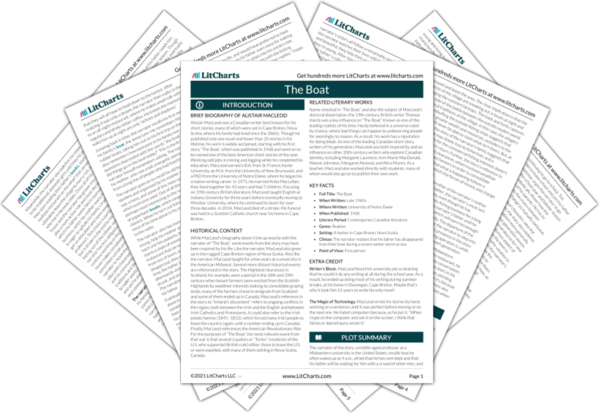Practically every object the narrator’s father owns carries symbolic significance, from his rubber boots (which represent his hardiness in life and so which are missing in death) to his radio (which connects him to the outside world while at the same time helping him tune out the domestic vision of his wife). The most enduring symbol that he owns, however, is his large collection of books. That the father’s books are all old paperbacks, many of them pulpy, suggests that he is frugal and unpretentious; yet the fact that his eclectic collection also includes literary classics suggests that he can also be cerebral. MacLeod suggests that enjoyment of “high art” like Dostoyevsky and Faulkner doesn’t have to be limited to ivory towers. The father’s strong interest in books shows that he is curious and intelligent, and that he had academic potential that he wasn’t able to fulfill because he had to take up fishing and preserve his family’s traditions. His deep interest in books combined with the narrator’s comment that his father had once wished to go to college implies that the father himself recognizes and regrets this thwarted potential.
In the story, there is also a clear cause-and-effect relationship between the narrator’s sisters discovering their father’s books and them eventually leaving their tight-knit fishing community for cosmopolitan cities around the world. As they reach adolescent, the sisters begin to read their father’s books and talk with him about what they read; and at the same time they lose interest in the domestic tasks given to them by the mother. Soon they start working at the restaurant in the village that serves tourists, meet well-off men who are visiting, and move away and marry. The clear implication is that the books are a gateway to an awareness of a bigger world, and as the sisters become aware of that world they step through the gate and don’t come back. Eventually, even after they leave the house, their main connection home is the books they send to their father. Notably, once they get older and start their own families, the books they send back begin to be hardcovers instead of paperbacks. This suggests a reversal of roles—now they are the ones providing books for their father, and, unlike their father, they have enough money to buy hardcovers, suggesting that the new generation has been able to achieve a new level of prosperity. The narrator’s own relationship with books is less straightforward than his sisters—at one point, he is willing to give up his education to help his family with the boat. Ultimately, however, he ends up as a university professor, suggesting that the books his father provided allowed him to achieve what his father always dreamed of doing for himself but couldn’t because of his circumstances.
Books Quotes in The Boat
Magazines and books covered the bureau and competed with the clothes for domination of the chair. They further overburdened the heroic little table and lay on top of the radio. They filled a baffling and unknowable cave beneath the bed, and in the corner by the bureau they spilled from the walls and grew up from the floor.

Unlock explanations and citation info for this and every other The Boat quote.
Plus so much more...
Get LitCharts A+By about the ninth or tenth grade my sisters one by one discovered my father’s bedroom, and then the change would begin. Each would go into the room one morning when he was out. She would go with the ideal hope of imposing order or with the more practical objective of emptying the ashtray, and later she would be found spellbound by the volume in her hand.












